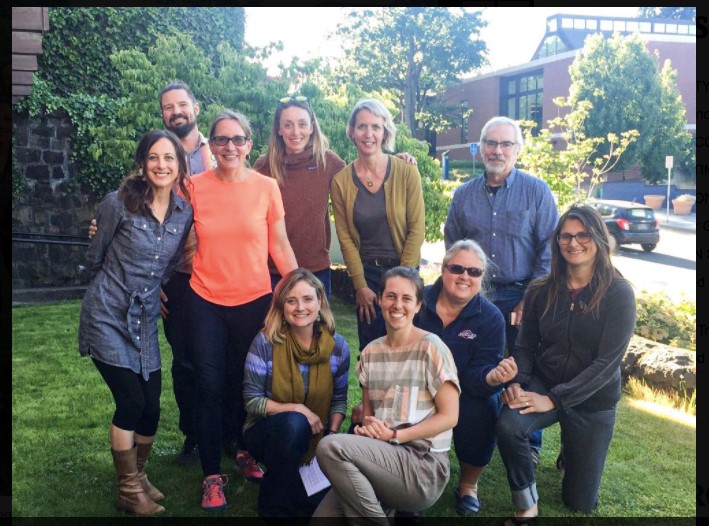Trainings
Six Rivers staff and volunteers bring years of experience in specialty fields to their mediation practice. With an array of knowledge that ranges from shared neutrals, public policy, international peace work, social services, collaborative process design, youth development, social security, disaster response, medicine and natural resource conservation, we bring a breadth of skills and expertise to our trainings.
Six Rivers offers the following standardized trainings, and we are always willing to work with you to develop a customized training to meet your situation and personalities.
Offered Trainings
Basic Mediation Training [40 hours]
The Six Rivers DRC Basic Mediation Training is designed to meet the standards for foundational mediation training set by both Oregon Statutes ORS Chapter 26 and Washington statutes RCW 7.75. This training covers conflict theory, process and skill development through a series of small class sessions, role plays and a diverse array of individual and group activities.
Circles: Learn how to facilitate a Circle based on Restorative Practices methodology. The Circle technique can be adapted to schools, organizations, communities, or any group wishing to build trust and openness and strengthen relationships. This training includes experience participating in a circle and an overview of the steps to lead a circle.
Art of Listening: Perfect combination of experiential session and applied theory. Transform your approach to listening through this hands-on and creative session aimed at building understanding and skills in order to become a listener with your ears, eyes, heart, and undivided attention.
Conflict Management 101: This training introduces participates to the five fundamental conflict styles. Skilled conflict experts identify their own and others’ conflict styles, then choose a strategy most likely to result in a positive outcome. In this training, you can expect to learn how to quickly analyze and respond to conflict from an informed, strategic, and effective perspective.
Uncovering the Source of Conflict: Strategizing to Find the Real Problem: This class offers a wonderful approach to frontline managers, supervisors, and customer service staff. We will take you two steps beyond congeniality. Learn what to say and how to say it when you encounter difficult people at work, at home or in other tough situations presented in life.
Professional Mediation Certification
Mediation Certification is available through Six Rivers. Applicants for Certification must complete the following minimum requirements. Certification through Six Rivers DRC shall qualify as having met the approved training requirements for Washington Mediation Association. Oregon State does not currently have a “certification” endorsement or Licensure requirements to practice mediation.
- Successfully complete Six Rivers’ 40 hour Basic Mediation Training Course or completion of a 36-40 hour Basic Mediation Training.
- Entry into Practicum: Includes entry exercise/exam, application form, and continued thorough record keeping by DRC and intern throughout intern’s practicuum. The DRC will include an interview/orientation as part of the application process, using the exercise/exam as a reference. The intern is responsible for documenting progress on all of the following requirements.
- Minimum Observations: Observation hours may include 30 minutes for set up and 30 minutes for debrief. Minimum of 20 hours of time allocated to observations and/or mock mediations. At least 14 hours must be in observations of at least 3 completed cases. The other 6 hours can be allocated to mocks or more observation of actual mediations.
- Minimum Mediations: Mediation hours may include 30 minutes for set up and 30 minutes for debrief. A minimum of 24 hours of actual experience in the role of mediator or co-mediator in at least 4 separate and completed cases. These cases may include small claims mediation cases with appropriate supervision. Evaluation forms should be used for all co-mediations. The co-mediation form is filled out in part by the mentor mediator, who at a minimum is a certified and experienced mediator. A self-evaluation form is filled out by the intern.
- Attend 4 mediation practice group sessions, acting as mediator in at least 3 sessions.
- Complete a mock mediation as a solo mediator proctored by DRC staff or approved mediator (per Director).
- Complete a minimum of 12 hours of Continuing Education. A minimum of 12 hours of additional education during the practicum that might include, but is not limited to:
- In-services
- Conference attendance
- Seminars
- Book review/article review
- Role playing & debriefing (mocks/demonstrations)
- Peer consultation
- Decision to Certify: Prior to certification, intern will complete a self-evaluation on the 18 skills for mediator competence. DRC staff will conduct an interview with intern to review their self-evaluation, completed cases and feedback from mentors and co-mediators.
That an intern may meet minimum requirements does not necessarily mean the DRC is mandated to certify intern.

The quality of our lives depends not on whether or not we have conflicts, but on how we respond to them.
